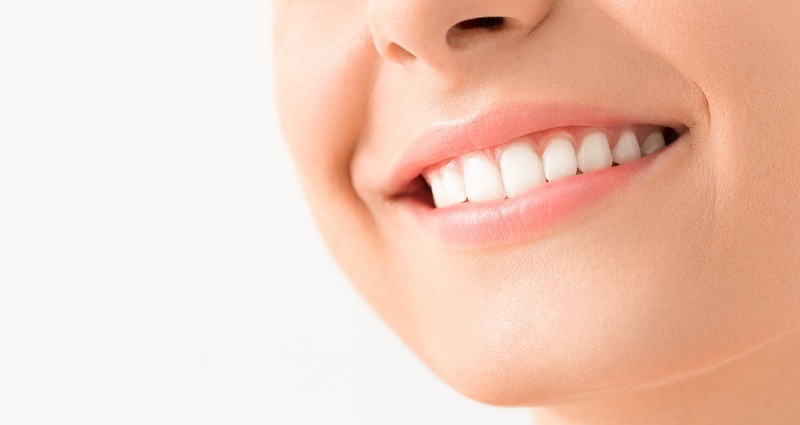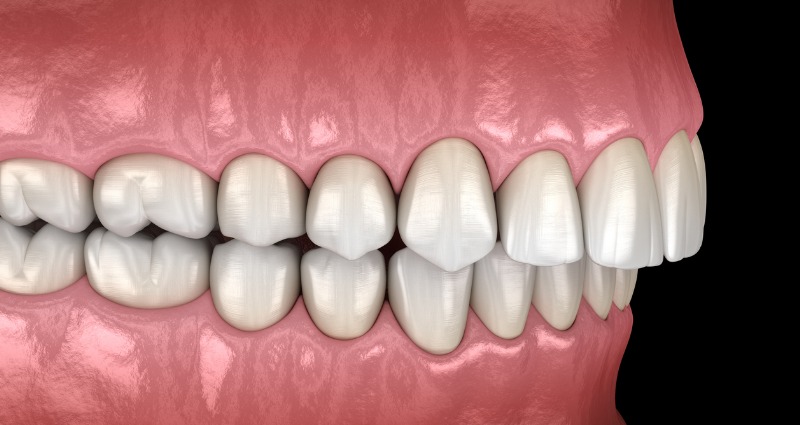
An overbite is one of the most recognisable problems that require orthodontic treatment. Overbites can also cause health and psychological problems, so it’s an orthodontic condition that is often treated earlier rather than later. Treatment methods and times depends on the severity of the case.
What is an Overbite?
An overbite is when the top jaw and teeth overlap the lower jaw and teeth. Dentists and orthodontists refer to overbites as a type malocclusion. An overbite may be vertical or horizontal. A vertical overbite is where the top teeth overlap the bottom and a horizontal overbite has the top teeth protruding over the bottom teeth (more commonly known as overjet). Some patients can have signs of both.
An overbite can also be classified as being dental or skeletal. A dental overbite is when the teeth are in the wrong position and skeletal means the jaw causes the overbite. Overbites are the most common dental disorder in children.

What Causes an Overbite?
It’s not clear why one person develops an overbite and another doesn’t. Some people are born with malformed jaws that develop unevenly. Others may be born with a jaw that is too big or too small for the teeth resulting in crowding or large spaces and an overbite. We know that genetics play a major part so if the parents needed orthodontic treatment for an overbite, it’s more likely their children will need treatment for similar problems.
Some of the deepest overbites are due to the environment rather than genetics. A child that consistently has a dummy or sucks their thumb or finger/s regularly past the age of five is at risk of pushing the bone and front teeth forward. The top teeth and jaw grow outwards to accommodate the forward tongue while the dummy or parts of the hand can push the bottom teeth and bone back. Encouraging a child to stop thumb sucking from five is important for allowing the jaw and teeth to develop as they should.
Even when a person passes childhood with no sign of an overbite, it could still develop as a teen or adult. Chewing fingernails, biting a pen consistently or losing teeth with no follow up treatment can cause an overbite later in life.
Correcting an Overbite with Braces
Can braces fix an overbite issues ? braces are effective for treating most overbite problems. As part of the assessment stage, x-rays help determine the overbite type and the relationship between the teeth and jaw. Braces are then attached to the top and lower arches of the teeth.
The arch wire first straightens and aligns the teeth. During the second stage of braces, elastics (small rubber bands) may be used to slowly shift the jawline into the correct position,addressing braces for overbite correction. The bands are fitted on the brackets from top to bottom or front to back to help move the teeth and jaw. The bands are removed before eating, drinking and brushing teeth and replaced. It is important to wear the bands at all times so constant pressure is applied. Wearing them on and off can cause the teeth and jaw to ache more often.
The final stage of treatment is to wear a retainer or use a permanent wire to keep the teeth in the desired place.
Some patients have the choice of the more concealed options of ceramic or lingual (inside) braces or Invisalign aligners to fix their overbite. It’s best to consult your orthodontist before deciding on the treatment type you want as not all treatment types are suitable for every case.
When Should Treatment Begin?
With an overbite, typically the earlier the orthodontic treatment can start the better. If a patient is grinding their teeth and clenching their jaw, they are damaging their teeth. Some overbites make teeth cleaning difficult so the patient is at risk of tooth decay and gum disease.
Living with regular headaches, migraines and jaw pain can impact everyday life. For some patients these health problems improve as soon as braces start moving the jaw into place.
How Long Does it Take to Fix an Overbite with Braces?
A deep overbite is one of the longest orthodontic conditions to fix with braces. Often the overbite isn’t the only problem either. The patient is likely to have crooked teeth or overcrowding so there are multiple problems to work on.
Every case is different but for severe overbite cases braces could be needed for at least two years. Once the braces come off, a retainer is worn to keep the teeth in place.
Can Braces Alone Fix an Overbite?
Some adults with severe skeletal overbite and jaw problems wonder if braces alone can fix overbite issues. In such cases, additional treatments to correct the problem and surgery is required to reposition the jaw. Braces need to be used in combination with other treatments such as surgery or tooth extractions. An orthodontist refers patients to an oral surgeon or dentist for extractions, especially in cases of braces for overbite correction.
Children and some teens have the benefit of a growing jaw to assist the braces move it into the correct position so surgery is less likely.
Early treatment of children may include a palate expander to increase the size of the jaw for the children requiring braces for overbite correction, especially when dealing with crowded teeth in a small jaw. A larger jaw makes it an easier job for the braces to move teeth into the correct position and stops the need for removing teeth.
Problems Caused By an Overbite
Parents most often recognise their child with an overbite has an orthodontic problem that needs attention. Children with an overbite will often come in earlier for treatment than other problems because they have health or psychological problems related to their teeth.
It’s Not Just About Aesthetics
Fixing an overbite is not a cosmetic procedure, it’s a functional issue that can cause other problems. Someone with an overbite will often suffer from related health problems. Some patients will connect the two, while others only make the connection after treatment or if the orthodontist asks. The most common health problems linked to overbites are:
Headaches
Headaches and migraines are common in people with an overbite because the jaw isn’t aligned. The muscles connecting the jaw to the skull overpower the lower jaw which can compress the joint and skull bone. Jaw muscles attach to the sinus and a jaw imbalance can cause sinus infections and sore throats.

Teeth Clenching & Jaw Grinding
During sleep, a patient with an overbite may clench their jaw, or grind their teeth. This can cause joint pain and wear on the teeth. They may recommend a retainer worn at night to protect the teeth before the overbite problem is resolved.
TMJ Disorder
One of the most common problems connected to an overbite is temporomandibular joint (TMJ) disorder. The joint that connects the jaw bone to the cheek bone on either side of the face allow movement for eating, drinking, talking and facial expressions. The symptoms of TMJ disorder include jaw pain, pain in front of the ear, a clicking noise while eating or opening the mouth and even locking of the jaw.
Neck Pain
Neck pain is also common in people with an overbite because the neck is closely connected to the jaw. If the jaw is imbalanced then neck or shoulder pain can result. Physiotherapy can help with the pain in the short-term but it may not resolve itself without aligning the jaw.
Facial Structure Altered by an Overbite
A deep overbite affects the look of the patient’s face. An overbite often gives the patient a recessive chin which makes their face look shorter and rounder and can make them appear older than they are. With orthodontic treatment the jaw‘s position changes because the chin comes forward and the face looks longer and narrower.
Speech Problems Caused by an Overbite
A patient with an overbite may speak with a lisp and use their tongue more which impacts on speech clarity. Fixing the overbite can often lead to improved speech in children and adults.
Psychological Effects of an Overbite on Children
Protruding front teeth are the most obvious orthodontic problem. Kids are cruel and it’s an easy taunt when their peer’s teeth are so noticeable. The bullying can cause serious self-esteem issues. Many parents request treatment as early as possible before their child’s peers tease them.
Increased Risk of Injury to Teeth
Someone with an overbite is at greater risk of damaging their teeth. When the top teeth protrude past the bottom, they can chip or be knocked out during sports, an accident or just being kids. Moving the front teeth back and fixing the overbite with braces ensures the teeth are more protected from knocks and falls.
Obligation-Free Assessment
If you think you or your child has an overbite, contact The Orthodontists by calling (08) 9364 8020 or booking an appointment online to discuss your options if we think orthodontic treatment is necessary.